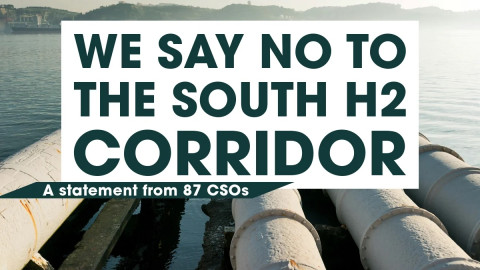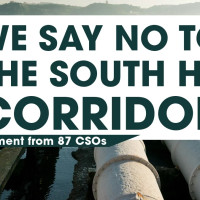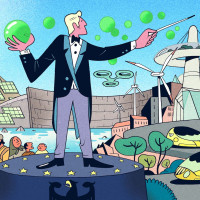Hydrogen Pipeline Sparks Outrage EU’s South H2 Corridor Faces Backlash Over Environmental and Social Risks
Temas
Regiones
Brussels, 17 March 2025 - A coalition of 87 civil society organizations and networks express their opposition to the South H2 Corridor in a joint statement released today. The construction of the 3,300 km hydrogen pipeline from North Africa to Germany via Italy was endorsed by governments in joint declaration signed fifty days ago.

As the EU Energy Council (also meeting today) debates energy security and the definition of ‘critical infrastructure,’ impacted communities are raising their voices to condemn the South H2 Corridor as a dangerous extension of the fossil fuel economy.
Backed by Snam, TAG, Gas Connect Austria, and BayerNet, the project was pushed through during the 2022 energy crisis under the guise of “energy security.” It has since then been listed as a Project of Common and Mutual Interest, a 2025 Global Gateway flagship project, and a key piece of the EU’s RePowerEU plan, which sets a target of 20 million tonnes (Mt) of green hydrogen by 2030. Yet as the statement warns, the corridor will serve corporate interests over local communities, locking in a costly export-driven energy model at the public’s expense.
“We oppose green hydrogen production and infrastructure development because of its extreme inefficiency; high volumes of cheap electricity and water are required for its production. This perpetuates extractivist patterns which amount to greenwashing on behalf of fossil fuel industries which divert in country efforts away from the critical scale-up of local community-owned renewable energy towards export purposes benefitting EU countries while ignoring local energy needs,” says Siphesihle Mvundla, Climate and Energy Justice Campaigner from groundWork, Friends of the Earth South Africa.
Shereen Talaat, Director at MenaFem Movement, adds “The South H2 Corridor is another violent expression of neocolonial and patriarchal extractivism. It exploits African land, water, and labor to feed Europe’s energy needs, while women—especially in rural and frontline communities—bear the brunt of water scarcity, land dispossession, and energy poverty. This is not a feminist or just energy transition.”
The EU, European governments, and the oil & gas lobby promote green hydrogen as a sustainable, win-win solution for the EU and Africa. Yet, as the statement warns, there is no guarantee that the corridor will exclusively transport green hydrogen or that its production chain will be socially and environmentally responsible. The project also risks fuelling land grabs, worsening water scarcity in already vulnerable regions and pushing African countries in debt distress, sparking social instability and draining resources from essential public services.
“EU’s Energy ministers having lunch today with the President of a fossil fuel industry lobby group to decide what counts as ‘critical infrastructures’ is a stark example of corporate capture. The EU is handing Big Polluters the steering wheel like never before. The recent Clean Industrial Deal (CID) is a case in point - a deal made with industry, for industry, that delivers most of their hydrogen demands. Europe cannot decarbonise at the cost of the Global South”, says Belén Balanyá, researcher and campaigner at Corporate Europe Observatory, “The first Clean Trade and Investment Partnership, announced between the EU and South Africa, is the newest push in this scramble for resources from the Global South."
The EU 2030 target for green hydrogen sets 10 Mt to be produced domestically, and 10 Mt to be imported from outside the EU. The South H2 Corridor is the first of five European corridors to be developed, and according to its promoters it should allow the transport of 4 Mt of hydrogen. Its total cost is unclear, but the Italian backbone alone is estimated by Snam in four billion euro. The European gas transport corporations that promote the construction of the five import corridors to Europe, estimate a cost between €80 and 130 billion.
"Mega-projects such as the South H2 Corridor and ELMED (the electricity interconnection between Tunisia and Italy) are neocolonial schemes that externalize the responsibility for decarbonization onto the Global South. These projects risk locking exporting countries into a carbon-dependent model while shifting the socio-ecological costs such as land, water injustices and human rights violations onto communities in the periphery. Meanwhile, profits and resources flow to industrial centers, perpetuating an unjust and extractivist energy system.", says Saber Ammar, North Africa Program Assistant at the Transnational Institute (TNI).
“The South H2 Corridor is the largest energy infrastructure pushed by the Italian government under the so-called Mattei Plan. However, it's not about energy security for European or African people, it’s about securing long life for gas transport infrastructure and public subsidies to fossil fuel corporations like Snam for building and maintaining them. It just greenwashes a neocolonial, extractive model that risks increasing African countries debt while diverting public resources away from a just energy transition for all" says Elena Gerebizza, Energy and Infrastructure researcher and campaigner at ReCommon.
The statement calls on governments, the EU, and African institutions to halt investments in large-scale hydrogen projects that obstruct a fair and democratic energy transition for communities in Europe and Africa.
Read the full statement here
You can see the list of signatories here
Download the statement here
For media inquiries, please contact:
- Chiara Casati, Counter Balance, chiara.casati@counter-balance.org, +32484901713
- Tsepang Molefe, groundWork, Friends of the Earth South Africa, media@groundwork.org.za; +27 74 405 1257
- Belén Balanyá, Corporate Europe Observatory, belen@corporateeurope.org, +31633090386
- Luca Manes, ReCommon, lmanes@recommon.org, +39 3355721837
- Saber Ammar,The Transnational Institute, s.ammar@tni.org, +21629422232



